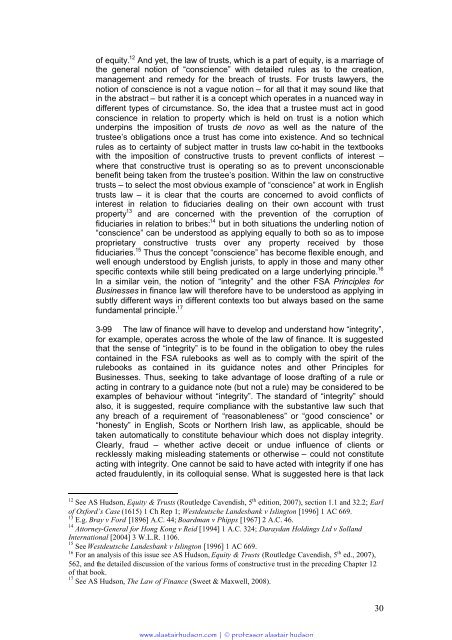England's dreaming equity, trust and conscience - alastairhudson.com
England's dreaming equity, trust and conscience - alastairhudson.com
England's dreaming equity, trust and conscience - alastairhudson.com
You also want an ePaper? Increase the reach of your titles
YUMPU automatically turns print PDFs into web optimized ePapers that Google loves.
of <strong>equity</strong>. 12 And yet, the law of <strong>trust</strong>s, which is a part of <strong>equity</strong>, is a marriage ofthe general notion of “<strong>conscience</strong>” with detailed rules as to the creation,management <strong>and</strong> remedy for the breach of <strong>trust</strong>s. For <strong>trust</strong>s lawyers, thenotion of <strong>conscience</strong> is not a vague notion – for all that it may sound like thatin the abstract – but rather it is a concept which operates in a nuanced way indifferent types of circumstance. So, the idea that a <strong>trust</strong>ee must act in good<strong>conscience</strong> in relation to property which is held on <strong>trust</strong> is a notion whichunderpins the imposition of <strong>trust</strong>s de novo as well as the nature of the<strong>trust</strong>ee’s obligations once a <strong>trust</strong> has <strong>com</strong>e into existence. And so technicalrules as to certainty of subject matter in <strong>trust</strong>s law co-habit in the textbookswith the imposition of constructive <strong>trust</strong>s to prevent conflicts of interest –where that constructive <strong>trust</strong> is operating so as to prevent unconscionablebenefit being taken from the <strong>trust</strong>ee’s position. Within the law on constructive<strong>trust</strong>s – to select the most obvious example of “<strong>conscience</strong>” at work in English<strong>trust</strong>s law – it is clear that the courts are concerned to avoid conflicts ofinterest in relation to fiduciaries dealing on their own account with <strong>trust</strong>property 13 <strong>and</strong> are concerned with the prevention of the corruption offiduciaries in relation to bribes: 14 but in both situations the underling notion of“<strong>conscience</strong>” can be understood as applying equally to both so as to imposeproprietary constructive <strong>trust</strong>s over any property received by thosefiduciaries. 15 Thus the concept “<strong>conscience</strong>” has be<strong>com</strong>e flexible enough, <strong>and</strong>well enough understood by English jurists, to apply in those <strong>and</strong> many otherspecific contexts while still being predicated on a large underlying principle. 16In a similar vein, the notion of “integrity” <strong>and</strong> the other FSA Principles forBusinesses in finance law will therefore have to be understood as applying insubtly different ways in different contexts too but always based on the samefundamental principle. 173-99 The law of finance will have to develop <strong>and</strong> underst<strong>and</strong> how “integrity”,for example, operates across the whole of the law of finance. It is suggestedthat the sense of “integrity” is to be found in the obligation to obey the rulescontained in the FSA rulebooks as well as to <strong>com</strong>ply with the spirit of therulebooks as contained in its guidance notes <strong>and</strong> other Principles forBusinesses. Thus, seeking to take advantage of loose drafting of a rule oracting in contrary to a guidance note (but not a rule) may be considered to beexamples of behaviour without “integrity”. The st<strong>and</strong>ard of “integrity” shouldalso, it is suggested, require <strong>com</strong>pliance with the substantive law such thatany breach of a requirement of “reasonableness” or “good <strong>conscience</strong>” or“honesty” in English, Scots or Northern Irish law, as applicable, should betaken automatically to constitute behaviour which does not display integrity.Clearly, fraud – whether active deceit or undue influence of clients orrecklessly making misleading statements or otherwise – could not constituteacting with integrity. One cannot be said to have acted with integrity if one hasacted fraudulently, in its colloquial sense. What is suggested here is that lack12 See AS Hudson, Equity & Trusts (Routledge Cavendish, 5 th edition, 2007), section 1.1 <strong>and</strong> 32.2; Earlof Oxford’s Case (1615) 1 Ch Rep 1; Westdeutsche L<strong>and</strong>esbank v Islington [1996] 1 AC 669.13 E.g. Bray v Ford [1896] A.C. 44; Boardman v Phipps [1967] 2 A.C. 46.14 Attorney-General for Hong Kong v Reid [1994] 1 A.C. 324; Daraydan Holdings Ltd v Soll<strong>and</strong>International [2004] 3 W.L.R. 1106.15 See Westdeutsche L<strong>and</strong>esbank v Islington [1996] 1 AC 669.16 For an analysis of this issue see AS Hudson, Equity & Trusts (Routledge Cavendish, 5 th ed., 2007),562, <strong>and</strong> the detailed discussion of the various forms of constructive <strong>trust</strong> in the preceding Chapter 12of that book.17 See AS Hudson, The Law of Finance (Sweet & Maxwell, 2008).30www.<strong>alastairhudson</strong>.<strong>com</strong> | © professor alastair hudson













